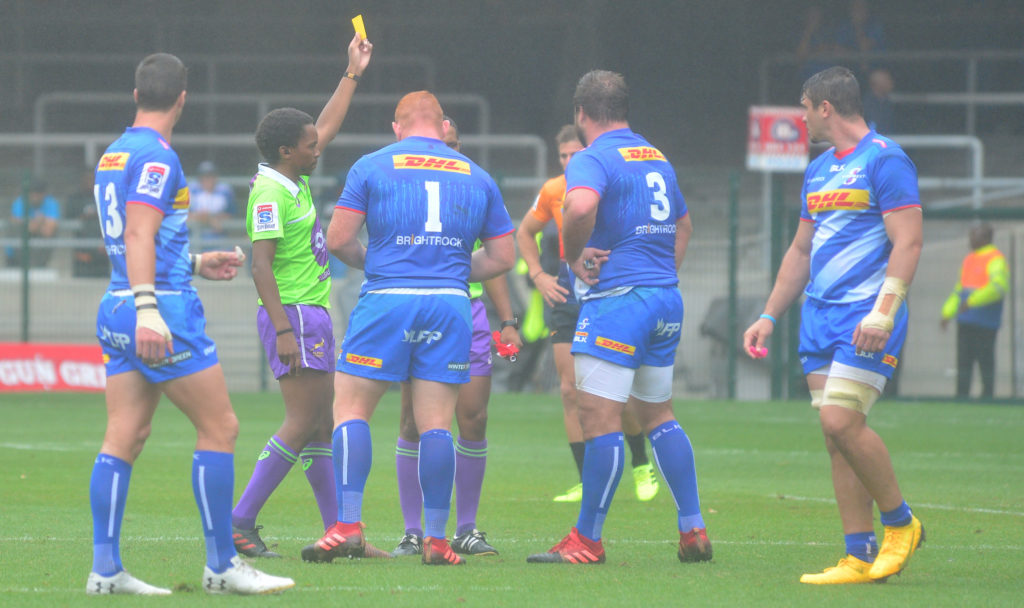Surprise, surprise! It didn’t take long in this year’s Vodacom Super Rugby competition for the light to shine brightly on the bugbear of every rugby fan – referees’ decisions.
Two yellow cards in two different games have set off a debate which comes down to one simple question – where is the common sense?
World Rugby has made it absolutely clear that it want to stamp out head-high tackles. This is admirable, but their one-size-fits-all approach is a mismatch, not only with rugby’s ethos but especially with the spirit of the game.
Let’s not kid ourselves – rugby is a collision sport. It is a test of physicality and while player safety has to take priority, situations are fluid and unique, and every incident should be judged on its merits.
*Follow us on our new Instagram journey by clicking here
On Saturday, Springbok tighthead Frans Malherbe went in to make a tackle, but fell awkwardly and lost his balance. Anyone with a television replay could see it was a slip, and Malherbe fell so awkwardly a genuine argument could be made that he was more of a danger to himself than to the opposition player.
But in the replay the opposition player fell as well, and there was contact with the head. Rasta Rasivhenge decided it was head-high contact and a yellow was issued, leaving anyone watching the game dumfounded.
A few hours later Burger Odendaal lined up Emoni Narawa in a textbook tackle that would have brought a smile to the face of any defence coach across the world. The commentators applauded it, referee Marius van der Westhuizen even initially awarded the penalty to the Vodacom Bulls. But then came those horrible words, ‘Check, check.’
What are your thoughts on the yellow card awarded to Vodacom Bulls captain @BurgerOdendaal for this tackle on @BluesRugbyTeam wing Emoni Narawa? pic.twitter.com/U5o3bIwFFf
— SA Rugby magazine (@SARugbymag) February 23, 2020
The replays – which always look worse in slow motion – showed Narawa had ducked low in taking the ball and Odendaal, whose arms were wrapped perfectly and who was coming in low, made contact with the neck. Another referee discussion and another yellow card.
What both situations highlight is a lack of common sense. Neither was malicious, and neither had any intent on harming the opposition player. In both situations the defender contributed to the head contact and in both situations, the referees ignored this. Neither should have been a card, and both were.
Afterwards Pote Human called it harsh, but muzzled by the protocols on not attacking referees he could do no more. Privately both teams are fuming about the incidents but they can do no more than direct a strongly worded email to referees bosses, which will be filed in the dustbin.
READ: Coaches fume at yellow cards
Top referees – who are also muzzled to talk – privately say they are given no option, that World Rugby has made it clear to issue cards for any – and that is the key word – any head-high contact. It is a situation that is ridiculous at its best.
Nobody argues that player safety should be prioritised, and head-high tackles should be outlawed. But if player safety was genuinely a concern then why aren’t players forced to all wear headguards? Why isn’t there stricter sanctions for collapsed scrums, which are much more dangerous for player safety?
And where is the responsibility of defenders in the entire process? It wouldn’t be surprising to see coaches to instruct their players to duck into future tackles, which has a safety concern of its own.
All the one-size-fits-all approach does is drive fan unhappiness, and it makes referees scapegoats for administrator decisions.
There is one thing missing to the entire situation: common sense. Rugby would be better off if it was applied here.





